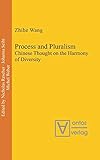Process and Pluralism : Chinese Thought on the Harmony of Diversity / Zhihe Wang.
Material type: TextSeries: Process Thought ; 23Publisher: Berlin ; Boston : De Gruyter, [2013]Copyright date: ©2013Description: 1 online resource (221 p.)Content type:
TextSeries: Process Thought ; 23Publisher: Berlin ; Boston : De Gruyter, [2013]Copyright date: ©2013Description: 1 online resource (221 p.)Content type: - 9783110328066
- 9783110328448
- 305.8 23
- HM1271
- online - DeGruyter
- Issued also in print.
| Item type | Current library | Call number | URL | Status | Notes | Barcode | |
|---|---|---|---|---|---|---|---|
 eBook
eBook
|
Biblioteca "Angelicum" Pont. Univ. S.Tommaso d'Aquino Nuvola online | online - DeGruyter (Browse shelf(Opens below)) | Online access | Not for loan (Accesso limitato) | Accesso per gli utenti autorizzati / Access for authorized users | (dgr)9783110328448 |
Browsing Biblioteca "Angelicum" Pont. Univ. S.Tommaso d'Aquino shelves, Shelving location: Nuvola online Close shelf browser (Hides shelf browser)
Frontmatter -- TABLE OF CONTENTS -- FOREWORD -- ACKNOWLEDGEMENTS -- INTRODUCTION -- Chapter 1: The Road toward Religious Pluralism: A Historical Survey -- Chapter 2: John Hick’s Religious Universalism: A Process Response -- Chapter 3: Heim’s Religious Particularism And a Process Alternative -- Chapter 4: Whiteheadian Religious Pluralism -- Chapter 5: Chinese Harmonism -- Chapter 6: Philosophical Foundation of Chinese Harmonism -- SELECTED BIBLIOGRAPHY -- INDEX
restricted access online access with authorization star
http://purl.org/coar/access_right/c_16ec
This book offers a uniquely process relational oriented Chinese approach to inter-religious dialogue called Chinese Harmonism. The key features of Chinese harmonism are peaceful co-existence, mutual transformation, and openness to change. As developed with help from Whiteheadian process thought, Chinese harmonism provides a middle way between particularism and universalism, showing how diversity can exist within unity. Chinese harmonism is open to similarities among religions, but it also emphasizes that differences among religions can be complementary rather than contradictory. Thus Chinese harmonism implies an attitude of respect for others and a willingness to learn from others, without reducing the other to one’s own identity: that is, to sameness. By emphasizing the possibility of complementariness, a process oriented Chinese harmonism avoids a dichotomy between universalism and particularism represented respectively by John Hick and S. Mark Heim, and will make room for a genuine openness and do justice to the culturally and religiously “other.”
Issued also in print.
Mode of access: Internet via World Wide Web.
In English.
Description based on online resource; title from PDF title page (publisher's Web site, viewed 28. Feb 2023)









